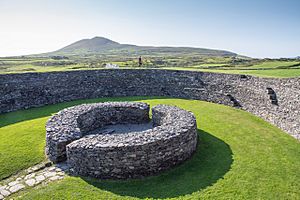Cahergall facts for kids
Quick facts for kids Cahergall |
|
|---|---|
| Native name Irish: An Chathair Gheal |
|
| Cahergal | |

Inside view of Cahergall
|
|
| Type | stone ringfort |
| Location | Kimego West, Caherciveen, County Kerry, Ireland |
| Elevation | 20 m (66 ft) |
| Built | c. 7th century AD |
| Architectural style(s) | Gaelic Ireland |
| Owner | State |
| Official name: Cahergall Cashel | |
| Reference no. | 227 |
| Lua error in Module:Location_map at line 420: attempt to index field 'wikibase' (a nil value). | |
Cahergall is an ancient stone fort in County Kerry, Ireland. It's also known as a cashel, which is a special type of stone ringfort. Today, Cahergall is protected as a National Monument because of its historical importance.
Contents
Where is Cahergall Located?
Cahergall is found in a beautiful part of County Kerry. It's located just southeast of another old site called Leacanabuaile. You can find it about 2.7 kilometers (1.7 miles) northwest of the town of Cahirciveen.
A Look Back in Time: Cahergall's History
This amazing stone fort was built a very long time ago, around the 7th century AD. That's over 1,300 years ago! People built Cahergall to be a safe place to live and farm. It was like a protected farmstead where families and their animals could be safe from danger.
What Does Cahergall Look Like?
Cahergall is a large, circular stone fort. It's made entirely of stone, without any mortar to hold the stones together. The inside of the fort is about 25 meters (82 feet) across. The outer walls are very impressive. They stand about 4 meters (13 feet) high and are a massive 5 meters (16 feet) thick. Imagine building something so strong with just stones!
The walls were built using a method called dry-stone construction. This means the stones are carefully placed together without any cement or mortar. It shows how skilled the builders were in ancient Ireland.
Exploring Inside the Fort
When you step inside Cahergall, you can see how people lived long ago. The thick walls would have kept out enemies and protected the people and their livestock. There would have been huts or other buildings inside the fort, though these are no longer standing.
The entrance to the fort is a narrow passage through the thick wall. This made it easy to defend against anyone trying to get in. Walking through the entrance feels like stepping back into history.
Images for kids
 | Jackie Robinson |
 | Jack Johnson |
 | Althea Gibson |
 | Arthur Ashe |
 | Muhammad Ali |






